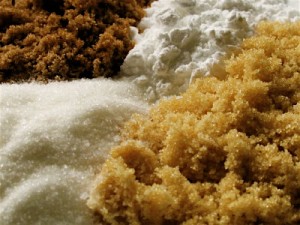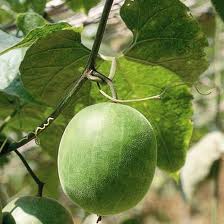 In the search to keep my sweet tooth from suffering the change in our diets I’m discovering a lot of great information. I’m not going to break down all the sugar options available since it’s already been done. But I am going to tell you which ones I’m interested in and I think are most healthful. Below is a graph that I hope breaks it down a little and descriptions of each option are listed under the chart. There are many options that I didn’t list because they were not a healthy option or they were similar to one of the items I did list. After doing this chart Luo Han Guo is an obvious winner in my book and I will be visiting the Asian market and health food stores to see if I can find it locally. The benefits we love from Stevia without the aftertaste, longevity of life, and is affordable since you use so little!
In the search to keep my sweet tooth from suffering the change in our diets I’m discovering a lot of great information. I’m not going to break down all the sugar options available since it’s already been done. But I am going to tell you which ones I’m interested in and I think are most healthful. Below is a graph that I hope breaks it down a little and descriptions of each option are listed under the chart. There are many options that I didn’t list because they were not a healthy option or they were similar to one of the items I did list. After doing this chart Luo Han Guo is an obvious winner in my book and I will be visiting the Asian market and health food stores to see if I can find it locally. The benefits we love from Stevia without the aftertaste, longevity of life, and is affordable since you use so little!
| Sweetner | Sugars/100g | Calories/100g | $/Serving |
| Date Sugar | 63.4g | 282 | $1.12 |
| Maple Sugar | 91g | 354 | $4.00 |
| Palm Sugar | 60g | 300 | $2.32 |
| Rapadura | 75g | 380 | $1.00 |
| Sorghum | 75g | 290 | $3.35 |
| Raw Honey | 89mg | 304 | $5.81 |
| Stevia | 0g | 0 | $1.24* |
| Luo Han Guo | 0g | 0 | $1.07* |
*additional $1 for 1 cup of applesauce for recipe consistency equality
Date Sugar– Made from chopped dried dates that have been ground into a powder without processing. Does not work well in recipes that require melting of sugar as it does not melt and may clump. Cooking ratio is two-thirds date sugar to one part refined sugar. Healthy vitamins and minerals. Can cause spikes in blood sugar levels. $4.20/lb
Maple Sugar– Made from evaporating the syrup of maple trees and then drying it and grinding into a powder. It is not processed. Cooking ratio is one part to one part refined sugar. Healthy vitamins and minerals. Can cause spikes in blood sugar levels. $10/lb
Palm Sugar– Made from evaporating the sap of coconut palms which is boiled, dried, and then ground. It is not processed. Cooking ratio is one part to one part refined sugar. Healthy vitamins and minerals. It has a low glycemic index of 35 compared to cane sugar’s at 50. $5.80/lb
Rapadura- Made by extracting the juices from the sugar cane, boiling it and then drying it. It is not processed. Cooking ratio is one part to one part refined sugar. Healthy vitamins and minerals. Can cause spikes in blood sugar levels. $2.50/lb
Sorghum Syrup– Made by extracting the juices from sorghum stalks, and boiling it down to a syrup. It is not processed. Cooking ratio is one part to one part refined sugar. Healthy vitamins and minerals. Can cause spikes in blood sugar levels. $3.35/lb
Raw Honey– Made by extracting from the beehive and running through a strainer. It is not processed. Cooking ratio is one part to one part refined sugar. Healthy vitamins, minerals, and anti-allergens. Can cause spikes in blood sugar levels. $7.75/1lb
Stevia– The glycosides are separated from the herb and refined into a liquid or a powder. It is 30-200 times sweeter than refined sugar and may have a unpleasant aftertaste. Does not give good results with recipes containing yeast. There are no calories and it does not raise blood sugar levels. $11.50/lb
 Luo Han Guo– Made from extracted mogrosides of a Chinese fruit and refined into a liquid or a powder. It is 300 times sweeter than refined sugar with no unpleasant aftertaste. There are no calories and it does not raise blood sugar levels. Longer lifespans have been documented in relation to consumption. $17.25/lb Note: I have not found this locally or online yet without additives like xylitol.
Luo Han Guo– Made from extracted mogrosides of a Chinese fruit and refined into a liquid or a powder. It is 300 times sweeter than refined sugar with no unpleasant aftertaste. There are no calories and it does not raise blood sugar levels. Longer lifespans have been documented in relation to consumption. $17.25/lb Note: I have not found this locally or online yet without additives like xylitol.
Sources- Azure Standard, Tried Tasted Served, Small Footprint Family, Wikipedia

LOVE me some palm sugar. you can buy it now at Natures Pantry or health food stores, but if you want it cheaper or more, try your local East Indian food market. they call it palm sugar or Jagery, and you can buy a giant block of it for $10 WOW!
How do you feel about Agave Nectar?
What is the sugar equivalent for baking compaired to regular sugar?
“Agave syrup is very high in fructose. Depending on the brand, agave can contain as much as 92% fructose. Nowhere in nature does this ratio of fructose to glucose occur naturally. The amount of fructose in agave is much, much higher than the 55% fructose in high-fructose corn syrup or the 50% fructose in refined table sugar, making agave “nectar” worse for you than either table sugar or corn syrup.” Source
wow. Here I was thinking that because it is a sweetner from a different source it would be broadening my horizon of intake….like eating sprouted bread instead of whole wheat. Bummer.
Thanks.